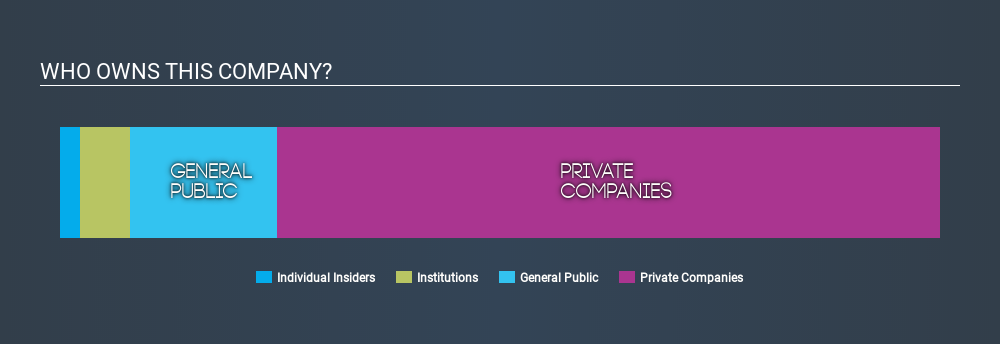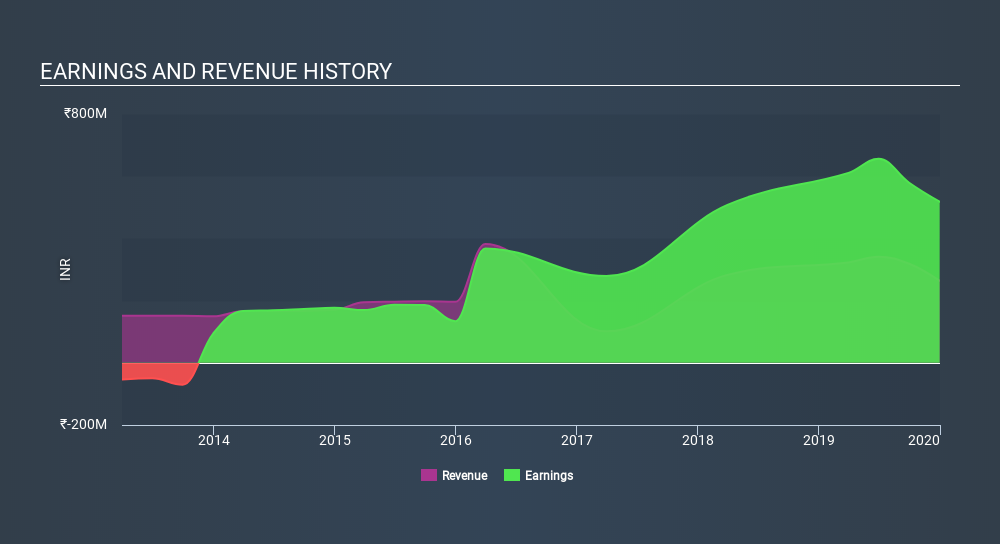- India
- /
- Capital Markets
- /
- NSEI:KICL
What Kind Of Shareholder Appears On The Kalyani Investment Company Limited's (NSE:KICL) Shareholder Register?

The big shareholder groups in Kalyani Investment Company Limited (NSE:KICL) have power over the company. Large companies usually have institutions as shareholders, and we usually see insiders owning shares in smaller companies. Companies that have been privatized tend to have low insider ownership.
With a market capitalization of ₹6.8b, Kalyani Investment is a small cap stock, so it might not be well known by many institutional investors. In the chart below, we can see that institutional investors have bought into the company. Let's delve deeper into each type of owner, to discover more about Kalyani Investment.
See our latest analysis for Kalyani Investment

What Does The Institutional Ownership Tell Us About Kalyani Investment?
Many institutions measure their performance against an index that approximates the local market. So they usually pay more attention to companies that are included in major indices.
As you can see, institutional investors own 5.7% of Kalyani Investment. This suggests some credibility amongst professional investors. But we can't rely on that fact alone, since institutions make bad investments sometimes, just like everyone does. If multiple institutions change their view on a stock at the same time, you could see the share price drop fast. It's therefore worth looking at Kalyani Investment's earnings history, below. Of course, the future is what really matters.

We note that hedge funds don't have a meaningful investment in Kalyani Investment. Looking at our data, we can see that the largest shareholder is Sundaram Trading And Investment Pvt. Ltd. with 61% of shares outstanding. With such a huge stake in the ownership, we infer that they have significant control of the future of the company. The second and third largest shareholders are Ajinkya Investment & Trading Company and Metrica Partners Pte. Ltd., holding 12% and 2.0%, respectively.
While studying institutional ownership for a company can add value to your research, it is also a good practice to research analyst recommendations to get a deeper understand of a stock's expected performance. We're not picking up on any analyst coverage of the stock at the moment, so the company is unlikely to be widely held.
Insider Ownership Of Kalyani Investment
The definition of an insider can differ slightly between different countries, but members of the board of directors always count. Management ultimately answers to the board. However, it is not uncommon for managers to be executive board members, especially if they are a founder or the CEO.
Insider ownership is positive when it signals leadership are thinking like the true owners of the company. However, high insider ownership can also give immense power to a small group within the company. This can be negative in some circumstances.
Shareholders would probably be interested to learn that insiders own shares in Kalyani Investment Company Limited. In their own names, insiders own ₹159m worth of stock in the ₹6.8b company. It is good to see some investment by insiders, but I usually like to see higher insider holdings. It might be worth checking if those insiders have been buying.
General Public Ownership
The general public holds a 17% stake in KICL. This size of ownership, while considerable, may not be enough to change company policy if the decision is not in sync with other large shareholders.
Private Company Ownership
It seems that Private Companies own 75%, of the KICL stock. It's hard to draw any conclusions from this fact alone, so its worth looking into who owns those private companies. Sometimes insiders or other related parties have an interest in shares in a public company through a separate private company.
Next Steps:
While it is well worth considering the different groups that own a company, there are other factors that are even more important. To that end, you should be aware of the 2 warning signs we've spotted with Kalyani Investment .
Of course this may not be the best stock to buy. Therefore, you may wish to see our free collection of interesting prospects boasting favorable financials.
NB: Figures in this article are calculated using data from the last twelve months, which refer to the 12-month period ending on the last date of the month the financial statement is dated. This may not be consistent with full year annual report figures.
If you spot an error that warrants correction, please contact the editor at editorial-team@simplywallst.com. This article by Simply Wall St is general in nature. It does not constitute a recommendation to buy or sell any stock, and does not take account of your objectives, or your financial situation. Simply Wall St has no position in the stocks mentioned.
We aim to bring you long-term focused research analysis driven by fundamental data. Note that our analysis may not factor in the latest price-sensitive company announcements or qualitative material. Thank you for reading.
About NSEI:KICL
Kalyani Investment
A non-deposit taking core investment company, engages in making investments in group companies in India.
Excellent balance sheet with questionable track record.
Market Insights
Community Narratives


